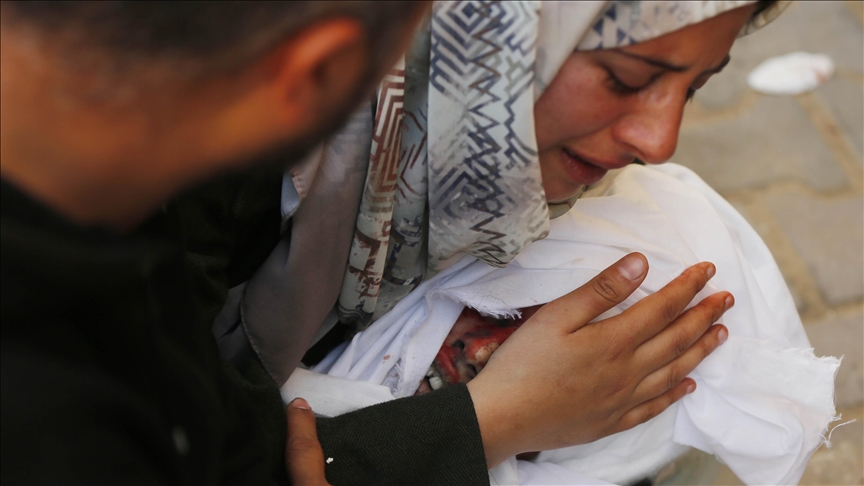Israel does not hide its intent to commit genocide in Gaza Strip: New Zealand activist Roger Fowler
‘Women, children, and families have no food. They are trying to drink water from puddles. People are eating grass,’ says advocate for International Freedom Flotilla and New Zealand Palestine Solidarity Network
 A Palestinian family hugs the dead body of their child who died in an Israeli attack in Deir al-Balah, Gaza on February 18, 2024.
A Palestinian family hugs the dead body of their child who died in an Israeli attack in Deir al-Balah, Gaza on February 18, 2024.
- ‘Women, children, and families have no food. They are trying to drink water from puddles. People are eating grass,’ says advocate for International Freedom Flotilla and New Zealand Palestine Solidarity Network
- Fowler says ‘tragedy’ extends beyond recent months, highlighting long-standing mistreatment endured by Palestinians for last 75 years
ISTANBUL
New Zealand activist Roger Fowler on Wednesday criticized the Israeli regime's actions in the Gaza Strip and said, “This is definitely genocide.”
The advocate for the International Freedom Flotilla and the New Zealand Palestine Solidarity Network told Anadolu: “The Israeli regime has not hidden its intention to destroy or displace the Palestinian people, especially those in Gaza, from the beginning. They are committing a terrible act -- killing tens of thousands of people, injuring more, and destroying a large part of this beautiful country.”
Fowler demanded action to halt the attacks and expressed hope about the potential effect of the International Freedom Flotilla – a grassroots organization working to end the illegal Israeli blockade of Gaza.
He noted large-scale protests against Israel's actions in Gaza and emphasized efforts to pressure governments, including through weekly protests in New Zealand to unequivocally condemn Israel's actions as unacceptable.
He stressed that the “tragedy” extends beyond recent months, highlighting the long-standing mistreatment endured by Palestinians, particularly those in Gaza, for the last 75 years.
Fowler pointed out the dire situation that Gazans face -- confined to a small territory with restricted access to essential resources including food, medicine, construction materials and necessities.
He noted his three previous trips to Gaza with land convoys, where he demonstrated solidarity and observed the dire circumstances faced by the population.
“Boycott is a very effective action,” said Fowler, underlining the significance of boycotts, isolation and sanctions, while stressing the necessity of enhancing and globalizing initiatives to end the blockade.
“I believe that boycotting has a great impact on pressuring not only major companies to withdraw from Israel and end their support, but also on making the Israeli government and our own governments understand that they need to stop what they are doing.”
Fowler also criticized the International Court of Justice's (ICJ) “genocide decision” for being ineffective due to the arrogance of those governing Israel.
South Africa brought a genocide case against Israel to the ICJ in December and asked it for emergency measures to end Palestinian bloodshed in Gaza, where nearly 30,000 people have been killed since Oct. 7.
The World Court ordered Israel in January to take "all measures within its power" to prevent acts of genocide in Gaza but fell short of ordering a cease-fire.
It also ordered Israel to take "immediate and effective" measures to enable the provision of urgently needed basic services and humanitarian assistance in the Gaza Strip.
He said all nations must persistently advocate and exert pressure for adherence to decisions by the UN court.
Fowler acknowledged efforts by UN personnel but he has concerns about their limited resources in Gaza, citing the only avenue for change is for people to pressure authorities to stop the genocide and ensure Israel is held accountable.
“It's definitely tragic and heartbreaking. Women, children, and families have no food. They are trying to drink water from puddles. People are eating grass. This is a very desperate situation. I really feel sorry for them. No one is talking about the children. Thousands of people are under the rubble, including small babies and children,” he said.
*Writing by Gizem Nisa Cebi








